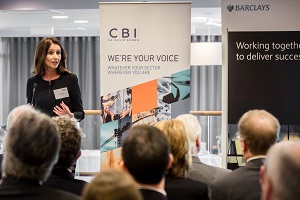Clarity on future immigration system “critical” for Thames Valley businesses says British Industry boss
Release Date 16 March 2017

The head of the Confederation of British Industry told businesses in the Thames Valley that the clarity over the immigration system is “critical”, as the UK Government prepares to trigger Article 50 and begin negotiations to leave the European Union.
In an event held at the University of Reading, leading industry heads from Thames Valley met to discuss future challenges for the region, including Brexit, the spring budget and industrial strategy.
Carolyn Fairbairn, Director General of the CBI and University of Reading Vice Chancellor Sir David Bell each delivered brief speeches about the closer role that business and the higher education sector can play in driving growth in the region, and then joined a panel which included Tim Smith MBE from the Thames Valley LEP and Ian Workman, Head of South East, Barclays.
Following the event, Carolyn Fairbairn said:
“The Thames Valley is renowned for its strong and international facing economy. The diversity of firms, from pharma to tech, adds hugely to its character, and the University provides a wonderful ecosystem for these businesses, whether cutting edge bio-tech or software companies planning to use the Science Park.
“From speaking with businesses across all industry sectors, it’s clear that many see opportunities from Brexit, but are also clear about their concerns. Knowing what a future immigration system will look like is critical for many across the Thames Valley, affecting everything from company secondments to forecasting.
“It’s also vital for businesses that the UK-EU negotiations get off to a good start, with some early wins on EU citizens’ rights, discussing a free trade agreement in tandem with the divorce and establishing a transition period up front."
Sir David Bell, Vice Chancellor of the University of Reading said:
“We are delighted to welcome Carolyn Fairbairn to the University of Reading at such a critical moment for the economy, both in the Thames Valley and in the UK more generally. We will all benefit enormously from hearing her insights as one of our most prominent business leaders.
“Universities play a crucial role in driving innovation, generating growth and creating jobs. The University of Reading values its relationships with businesses in the Thames Valley. Together, we can ensure that our region remains one of the most prosperous in the country.”
Ian Workman, Barclays Co-Head of Business Banking Relationships UK, who chaired the event, said:
“Barclays is proud sponsor of this high profile CBI event which has attracted many of the region’s leading businessmen and women. It has provided the perfect platform to highlight some of the challenges and opportunities ahead while continuing to recognise the strength of the Thames Valley business community and the exceptional talent the region has to offer.”
The event was live streamed and is available to watch again at:
https://www.facebook.com/theuniversityofreading/videos/1057120681061392/
About the Thames Valley Science Park
The University of Reading is opening the first stage of our 800,000 square foot Thames Valley Science Park next year, and the park will eventually support 5,000 jobs and 80 firms. The Gateway building, which will see 70,000 square feet of space, will open in August.
About the Henley Business School
The University of Reading is home to the Henley Business School – consistently ranked in the top 50 by both the FT and Economist and in the top 1% of business schools worldwide with its triple accreditation from UK, US and European accrediting bodies. The Business School is providing leading highly practical, collaborative and academically rigorous executive education, enterprise modules, and the Henley MBA was rated by the Economist at #1 in the world for potential to network.